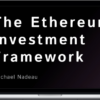James Tapia – An Introduction to Cryptocurrencies: The Crypto Market Ecosystem
$197.00 $118.00
Delivery: Within 7 days
Description
James Tapia – An Introduction to Cryptocurrencies: The Crypto Market Ecosystem
Over 6 Chapters with Charts, Analysis, Infographics and Images of a complete detailed guide to cryptocurrencies and blockchain technology, This Course covers the original idea and motivation, the mode of operation and applications of cryptocurrency.
This course will be beneficial to:
- People who are interested in finances, investing, and technology.
- People who are being relatively risky, not overly fearful of the volatile nature of cryptocurrency, while being tech-savvy enough to understand the basic mechanics of how crypto-related products and services work.
- People who demand value.
- People who are looking to trade in the near future (You must know the basics and fundamentals of Cryptocurrencies and how they work before you venture into trading so as to avoid impending loss)
- People who embrace decentralization (decentralization allows you to operate bitcoin outside the control of governments and central authorities)
- People who want to have experience of being trained as a professional in Mining, Staking, Master Nodes, Cybersecurity, Crypto Programmer, Swing Trading, Margin Trading, Market Analysis, Technical Analysis, UV Designer, Fundamental Analysis, Crypto Marketer, Crypto Community Manager, E.T.C… This course is the ultimate way to advance your career.
The aim of the course is to provide learners with the foundations and tools to properly assess opportunities in this interesting new space.
What You’ll Learn In An Introduction to Cryptocurrencies: The Crypto Market Ecosystem
- Abstract, Course Overview, Learning Objectives and Introduction to Cryptocurrency
- Module 1: The new era of encrypted Finance
- Module 2: The Infrastructure: the Blockchain technology
- Module 3: The traded assets: Introduction to Cryptocurrencies
- Module 4: “Tokenomics” and Valuation
- Module 5: Fund raising: Initial Coin Offerings: (ICOs)
- Module 6: The Regulatory Framework
- FREQUENTLY ASKED QUESTIONS ON CRYPTOCURRENCY
- Crypto A to Z: Cryptocurrency glossary of common terms
- Disclaimer
Delivery Policy
When will I receive my course?
You will receive a link to download your course immediately or within 1 to 21 days. It depends on the product you buy, so please read the short description of the product carefully before making a purchase.
How is my course delivered?
We share courses through Google Drive, so once your order is complete, you'll receive an invitation to view the course in your email.
To avoid any delay in delivery, please provide a Google mail and enter your email address correctly in the Checkout Page.
In case you submit a wrong email address, please contact us to resend the course to the correct email.
How do I check status of my order?
Please log in to TradingAZ account then go to Order Page. You will find all your orders includes number, date, status and total price.
If the status is Processing: Your course is being uploaded. Please be patient and wait for us to complete your order. If your order has multiple courses and one of them has not been updated with the download link, the status of the order is also Processing.
If the status is Completed: Your course is ready for immediate download. Click "VIEW" to view details and download the course.
Where can I find my course?
Once your order is complete, a link to download the course will automatically be sent to your email.
You can also get the download link by logging into your TradingAZ account then going to Downloads Page.











